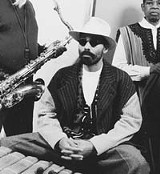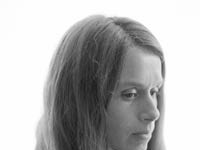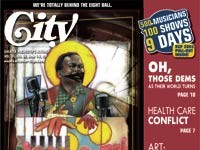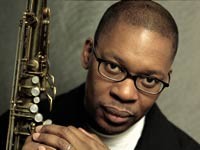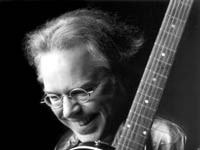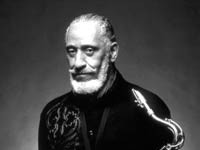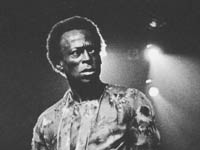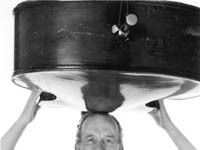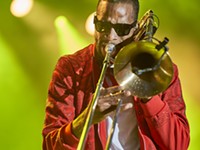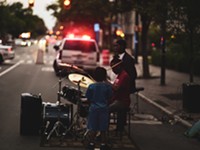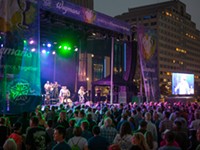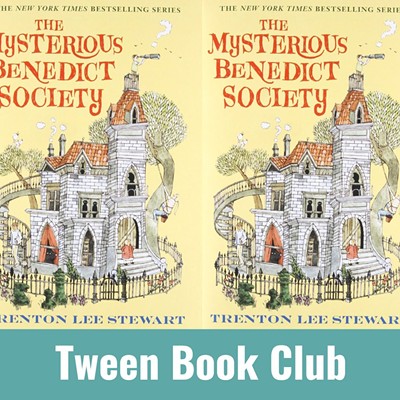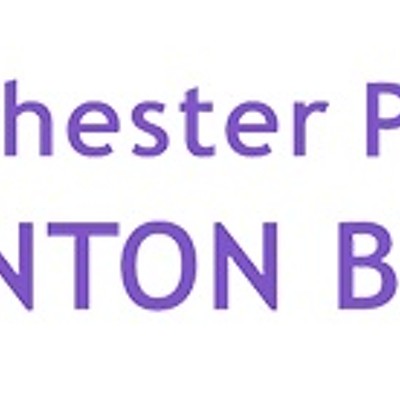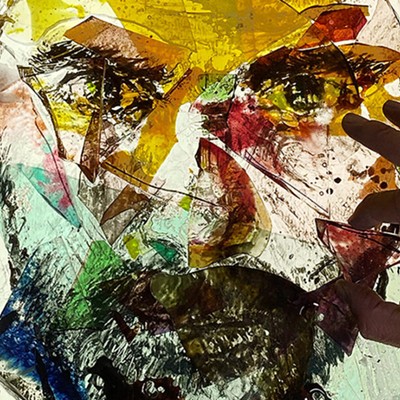[
{
"name": "500x250 Ad",
"insertPoint": "5",
"component": "15667920",
"parentWrapperClass": "",
"requiredCountToDisplay": "1"
}
]
In the world of percussionist Kahil El'Zabar, drums are never relegated to the background. And when it comes to jazz, Chicago is definitely not the second city.
El'Zabar has been a major force on the Chicago music scene since the 1970s, when he became affiliated with the Association for the Advancement of Creative Musicians (AACM). For more than three decades he has led the Ethnic Heritage Ensemble, working with musicians like Joseph Bowie on trombone and Ernest "Khabeer" Dawkins on sax. Although the EHE is typically categorized as avant-garde, the group's recent album, Freedom Jazz Dance, contains elements of bebop, funk, and traditional music along with more progressive sounds.
I spoke to El'Zabar shortly after he returned to Chicago from his group's recent European tour. Following is an edited version of our conversation.
City: Can you describe the music scene when you were coming of age in the 1960s in Chicago?
El'Zabar: It was very exciting because there were a lot of different interesting, passionate, and creative people. There were great r&b players like Louis Satterfield, Maurice White, Donny Hathaway, Curtis Mayfield, and Jerry Butler; the cats from the Association: Lester [Bowie], Joseph [Jarman], and [Anthony] Braxton; peers like Steve Coleman and Chico Freeman; all these different kinds of energies. Malachi [Favors] could play with Coleman Hawkins and the Art Ensemble [of Chicago] and the gospel choir every Sunday. As a teenager, seeing that kind of expanded relationship to music took you outside of genres.
City: There was quite a difference between the Chicago and New York scenes.
El'Zabar: Here it's not hired guns like in New York. They're just consummate technicians in different areas of music who have enormous personas based on that. Here, even though someone like Von Freeman is an enormous technician, the first thing you really pick up is the human being. In Lester [Bowie]'s playing, you always pick up the humor and the human experience. We had camaraderie. Those things for me were probably more meaningful than the performances --- the extended family relationships.
City: Sounds like you were living and breathing music.
El'Zabar: I lived at 84th and Wabash, and Roscoe [Mitchell], Malachi [Favors], and Kalaparucha had a house two blocks away, over on 83rd and Indiana. So at 13 I saw them every day when I was walking to the park to play basketball. A couple of years later I was playing with them, but before that I knew them as people.
I grew up seeing Herbie [Hancock] before he moved to New York. Jack DeJohnette lived with a friend of mine. Eddie Harris --- I worked with him since I was 16 years old --- and Gene Ammons. Later on, when I went to Europe, I started realizing the magnitude of people I knew on an everyday basis.
City: Another difference in the Chicago scene seems to be how seriously people took the music. Just the names of the groups: the Art Ensemble, Ethnic Heritage Ensemble...
El'Zabar: Just think about people coming up the Mississippi, from the Delta belt or New Orleans, from blues influences or early so-called jazz influences. They came up in a social aggregate as troubadours to give service to communities who now have found work in a different environment. King Oliver had an entire environment, working with baseball players, playing in bordellos, and having rent parties with people talking and singing. It was not just a show, but people utilizing the artists in the fabric of life.
Think about the bands that developed in the 1920s and the cultures around those bands: Jelly Roll Morton, King Oliver to Louis Armstrong and the Hot Five to Robert Johnson and, later, Muddy Waters. Everyone has always looked at it like that. Then it's alchemized through the ideology. Sun Ra writes arrangements for Fletcher Henderson. He takes it to a different place and creates the Arkestra. So it's not just the AACM, it's a whole tradition, the idea of intercultural relationships and then identifying your music with that.
City: There also seems to be a different attitude toward percussion in Chicago.
El'Zabar: In Chicago you had Master Henry Gibson, who played with Curtis Mayfield, Earl DeRouen, and me. I worked with Donny Hathaway and Stevie Wonder. You had Don Moye, Derf Reklaw who worked with Earth Wind & Fire. All of us played together in the park. I was 13; they were 19, 20. We developed a thing called the Sun Drummer with Atu Harold Murray, an elder cat who went to Africa and worked with Big Black and Sun Ra. He passed on to us a philosophy of making the instruments, and the percussionist as a leader, not necessarily an accompanist. You'll see something unique to percussionists in Chicago.
City: What did you do with Stevie Wonder?
El'Zabar: I played on "Isn't She Lovely" and toured with him for three years.
City: That was the period when brilliant songs were flowing out of him.
El'Zabar: His capacity, his internal powers are so profound. But Stevie Wonder is kind of like Charlie Parker in Kansas City. Bird was a genius but it was the environment around him that stimulated that. In Stevie's case it was all the cats in Detroit, the jazz players, the r&b players, the arrangers, and the culture of a refined popular-music phenomenon. He was an archetype of that experience.
City: You also worked on "The Lion King."
El'Zabar: I worked with Julie Taymor on a couple of off-Broadway productions. We were in LA on an arts board and she got a call from Disney about creating The Lion King for theater. She said, "If I get it I want you to work with me." So I spent a year in New York working with Julie and Garth Fagan. I worked on the arrangements because they needed someone who understood the sensibilities of African music but could also score on a symphonic level. I'm one of the few people who can do that.
City: What's the philosophy behind the Ethnic Heritage Ensemble?
El'Zabar: When I was at Lake Forest College in 1971, I was supposed to go to Paris to study pantomime with Marcel Marceau. I didn't want to do that. My percussion teacher wrote to a professor at the University of Ghana and I went there instead. One of my teachers in Ghana, Asinahini, said, "Can you sing the blues?" I said "Yes." He said, "You know, that's your heritage. Your voice comes from the land where you were born and it's good that you learned all these things but it's not your first voice. Be honest to yourself if you're going to be a musician, know your first voice."
I came back in 1972 with the idea that I was going to create a band called the Ethnic Heritage Ensemble. We had our first performance in 1973 as a quintet. We had an invitation to go to Europe in 1975 and the bass player and the other drummer didn't want to go, so I left with two saxophones and we became known as Two Horns and a Drum. The idea was taking the traditions of West African culture and applying them to a contemporary value system of music: blues, jazz, funk, etc.
City: Is your music more popular in Europe?
El'Zabar: A decade ago that was probably true, but the United States is really going through a change with this music. I think it's because most of my generation is 50 and older. [It's like] Dizzy Gillespie, Max Roach, Sonny Rollins had developed bebop in 1945, but it was in the mid-1960s they gained popularity in the States.
In the 1940s they were in this obscure beatnik kind of environment. Ferlinghetti and Ginsberg would emulate them in their poetry. The subculture of the beat generation developed, people like Marlon Brando and James Dean came on the scene, but no one in popular culture was really dealing with Monk or Dizzy. By the 1960s their form was considered classical, and they were working in all the clubs.
Now we're kind of in that period. We developed in the 1960s and 1970s and we've survived. The people in the loft scene in New York in the 1970s, the AACM... they're now getting a respectability based on duration more than anything else.
City: Is your music finding a new audience?
El'Zabar: I have people that tell me about hearing Three Gentleman from Chicago who are 20 years old, that they heard songs like "My Brother Malcolm" that I wrote 30 years ago being remixed by DJs. So I'm now experiencing in my middle age what I experienced when I went to see Monk or Von [Freeman] and Muhal [Richard Abrams]. I'm on the other side now.
City: What do you have planned for Rochester?
El'Zabar: Joe Bowie is not coming because he lives in Holland, so we're bringing Cory Wilkes, a young trumpet payer who took Lester Bowie's place in the Art Ensemble. He's quite a phenom. It's going to be a real surprise hearing this young cat.
The Ethnic Heritage Ensemble with Kahil El'Zabar plays at Kilbourn Hall, 26 Gibbs Street, on Wednesday, June 15, at 6 and 10 p.m., as part of the Rochester International Jazz Festival. Free with Club Pass. $20 tickets available at the venue, space permitting. www.rochesterjazz.com
In This Guide...
Latest in Rochester International Jazz Festival
More by Ron Netsky
-
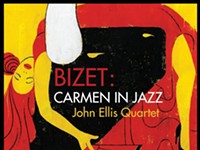
Album Review | 'Bizet: Carmen in Jazz'
Mar 26, 2024 -
'To Swing Is the Thing" by Mike Melito
Aug 10, 2023 - More »
